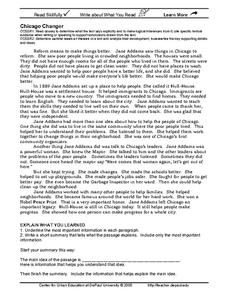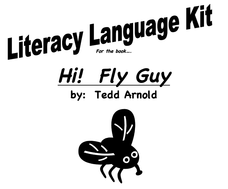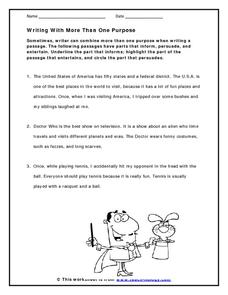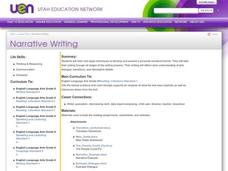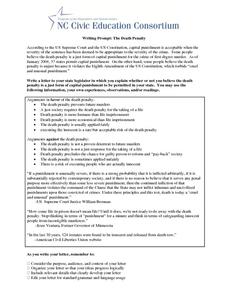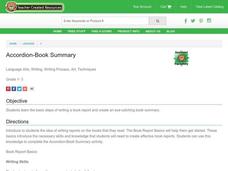Curated OER
What's My Point: Persuasive Writing
Why do readers need to know an author’s purpose? How do you figure out what that purpose is? Guide your pupils through a series of activities that show them how to identify various techniques and structures used in persuasive writing....
Curated OER
Creative Writing - Research and Letters
Here's a fresh approach that combines research, business and personal letter writing, and creative story telling. Student groups research different decades in the life of a famous Japanese astronomer. They then craft a decade fact sheet,...
Curated OER
Everyone Can Write Poetry
Embark on a journey of writing several different types of poetry. Fifth graders read several examples, and use the examples to model their own writing. Each poem is to be accompanied by a different art visual representation. In the end,...
DePaul University
Chicago Changer: Jane Addams
The power of a single person to change a community is amazing. Read about about how Jane Addams witnessed people living terrible lives in Chicago and chose to do everything she could to help them. When finished, young learners identify...
Curated OER
Writing Paragraphs
Bring burgers to you classroom! Print this fun graphic organizer to help beginning writers understand the most important parts of a solid paragraph. First, introduce your topic. Next, include supporting details. Finally, include a short...
Curated OER
How Do I Write an Article Critique?
Your middle and high schoolers have written tons of summaries, but can they give a strong critique of an article they've read? Identify the differences between summary writing and critiquing. Choose an interesting article and have...
Curated OER
Build Mastery: Sequencing
Writing a summary is much easier once you've laid out the sequence of events. Show readers how these two skills are intertwined using this graphic organizer. Review the meaning of sequencing first, presenting the chart and possibly...
Curated OER
Whittle, Whittle it Down: Summarizing
Middle schoolers summarize a one to two page article of informational text. They compose a summary according to the guidelines on the "Five Rules for Writing a Summary" chart. They take turns reading their summary to the group, and...
University of North Carolina
Summary: Using it Wisely
Sometimes summarizing keeps a writer from going deeper into their analysis—don't fall into that trap. Learn the difference between summarizing and analyzing using an insightful resource. Focusing on introductions, the lesson shares...
Curated OER
What Was That All About?
Through direct instruction, the teacher demonstrates how to identify the main idea and supporting details of a text when creating a summary. As a class, read a paragraph, highlighting relevant information and crossing out extraneous...
Poston Butte High School
Literacy Language Kit for the Book Hi! Fly Guy
Create a buzz in your class with this collection of learning activities for the book Hi! Fly Guy. Including a list of comprehension questions, a sequence of events activity, a summary writing assignment, and a vocabulary list, this...
Trinity University
Explain Yourself: An Expository Writing Unit for High School
Introduce expository writing with a unit that asks writers to craft an essay to explain a belief, value, or priority that is important to them. Mini-lessons within the unit focus on crafting thesis statements and conclusions, selecting...
Syracuse University
Ancient World Writing System
Most twenty-first century pupils don't know how to interpret cuneiform. Examining images of cuneiform and papyrus writing and using a chart and Venn diagram, young historians extrapolate what life may have been like for people who lived...
Teach-nology
Writing with More Than One Purpose
It's not very hard to find the author's purpose in narrative, informative, or persuasive writing, but what happens when an author's purpose includes all three types of writing? Determine which sentences in three paragraphs are meant to...
Fluence Learning
Writing an Opinion: Student Council
A three-part assessment challenges scholars to write opinion essays covering the topic of the student council. After reading three passages, writers complete a chart, work with peers to complete a mini-research project, answer...
Curated OER
Writing a Personal Narrative
What is the difference between a news story and a personal narrative? This plan has learners write a personal narrative using the topic of service projects in their community. Consider completing a cross-curricular extension by bringing...
Curated OER
Narrative Writing
Binoculars are used as a metaphor for good descriptive writing. Class members first view a small picture and then an enlarged view of the same image in which the details come into focus. Next, learners examine a paragraph lacking sensory...
Polk Bros Foundation
How to Summarize a Non-Fiction Passage
After reading a text, one way to find out how much your class comprehended is to ask your pupils to summarize. This worksheet helps class members prepare for writing a summary of a nonfiction text. They note down the topic, up to eight...
Curated OER
A Handmade House Book with Student Writing
Use this lesson for your bookmaking project. First, young writers work on making an accordion fold house book. After composing a variety of pieces of writing, they can use their book to store their writing. The structure is ideal for a...
EngageNY
End of Unit 2 Assessment: Working with Two Texts - Reading, Listening, Summarizing, and Synthesizing
As a summative assessment for this unit on colonial trade, fourth graders listen to and read informational texts in order to demonstrate their ability to take notes, write summaries, and draw connections. Young scholars first listen as...
Curated OER
Comparing Two Stories
Compare new and old versions of the classic story Alice in Wonderland in this comprehensive worksheet packet. Learners read an excerpt from the original, answering several analysis questions. They do the same for a more modern version,...
EdHelper
The Kid in the Red Jacket by Barbara Park
If you're reading The Kid in the Red Jacket by Barbara Park, use a handy reference sheet to help kids format a book report. After filling in the basics of the book, such as author, main characters, and setting, learners answer several...
Carolina K-12
Writing Prompt: The Death Penalty
Is the death penalty unjust because it violates the Eighth Amendment of the United States Constitution, "cruel and unusual punishment"? Or is it just a form of permissible capital punishment? After weighing arguments for and against the...
Curated OER
Accordion-Book Summary
Introduce your young readers to the book review. Groups of writers practice the basic steps of writing a book report and complete an Accordion-Book Summary activity. The lesson includes book report basics and directions to make...
Other popular searches
- Summary Writing
- Writing a Summary Paragraph
- 4th Grade Writing Summary
- Summary vs. Response Writing
- Summary Writing Powerpoint
- Nonfiction Summary Writing
- Teaching Summary Writing
- Chapter Summary Writing
- Writing a Summary "Esl"
- Summary Writing Activities
- Writing a Summary Esl
- Summary Writing Exemplars





